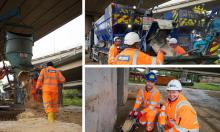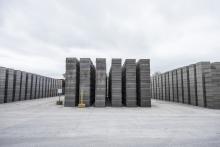
The 300m3 continuous pour, which supports the foundation for a new step-free access at Chatham Station, is the first use of the Cemfree product that is made by DB Group on the UK rail network. Production of Cemfree reduces carbon emissions by up to 80% in comparison to traditional cement-based concrete.
BAM Nuttall says tht the use of Cemfree to deliver this project rather than traditional concrete, saved approximately 62 tonnes of carbon from entering the atmosphere – the equivalent of 230,000 miles in an average-sized diesel car.
Huw Jones, BAM Nuttall divisional director, rail said that traditional concrete production contributes 8% to global carbon emissions in its own, which is more than three times the output of the global aviation industry.
"That carbon footprint is largely due to the energy intensive methods that go into the production of cement, a vital component of traditional concrete," he added.
Sarah Borien, head of environment & sustainability at Network Rail, commented: “Cemfree concrete has reduced our embodied carbon by 83% in this instance and shows how our capital projects can make simple changes as part of our journey to carbon net zero.”
Tony Sheridan, group commercial manager at DB Group, said: “This is our first major project associated with Network Rail and has demonstrated the ability to specify Cemfree on future schemes. The efforts made at the design stage to understand the material and therefore its ability to meet the requirements of the specification, has helped embed a process that will enable future Network Rail projects to drastically reduce their embodied carbon."
BAM says it is currently investigating further opportunities to make use of low cement and cement free product sites across the UK.








